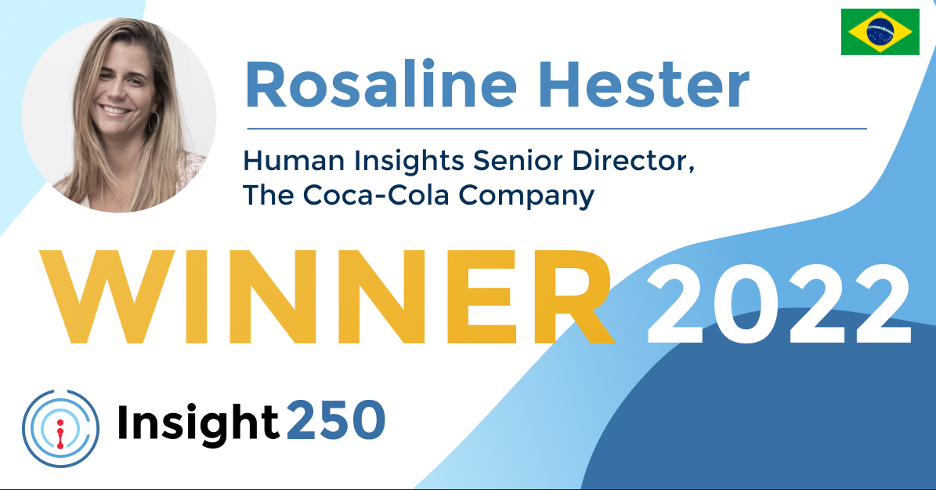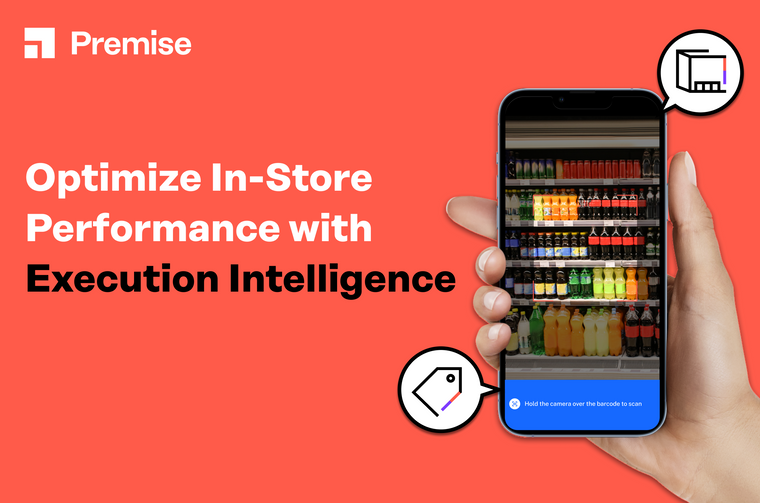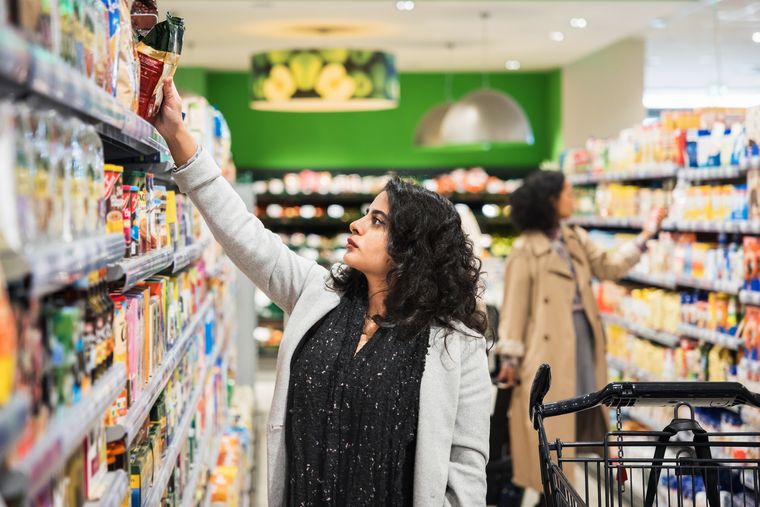The impact of Insights on the FMCG Beverage Industry
Rosaline Hester discusses how advancements in market research and evolutions in insight technology are impacting consumer understanding, competitive analysis, and customer experience, specifically in the fast-moving consumer goods (FMCG) space.

The Insight250 spotlights and celebrates 250 of the world’s premier leaders and innovators in market research, consumer insights, and data-driven marketing. The inaugural list was revealed in April 2021, and the 2022 winners were announced in Toronto last September at ESOMAR’s Annual Congress. The awards have created renewed excitement across the industry whilst strengthening the connectivity of the market research community. The 2023 Winners will be announced in the early summer.
With so many exceptional professionals named to the Insight250, it seems fitting to tap into their expertise and unique perspectives across various topics. This weekly series does just that; inquiring about the expert perspectives of many of these individuals in a series of short topical features.
This edition features Rosaline Hester, Human Insights Senior Director with The Coca-Cola Company. Rosaline discusses how advancements in market research and evolutions in insight technology are impacting consumer understanding, competitive analysis, and customer experience, specifically in the fast-moving consumer goods (FMCG) space. However, these are challenges and opportunities that nearly every major sector faces today, so insight professionals must keep pace.
Understanding the constant change of trends and developments in the consumer goods industry, specifically with food and beverage, has never been more critical. And today, with mTab Marketplace, it has never been more accessible with datasets, reports, and studies from leading research sources like Tastewise, Nourish, JP Morgan, PWC, BCG, Barnes, and a spectrum of other providers all in one place, conveniently and economically delivering a world of insights and research like never before.
Is the role of insights in the FMCG industry changing, or has the role of the insights professional remained static?
If there’s something constant nowadays is change! We’re living and doing business in an extremely fast-paced and complex environment, so we cannot do the same and expect that results are better. How can we best deliver strategic & human-centric insights to inform decision-making in this context? How can we inspire our organisation to lead the future? These are key questions our role must answer today, and advanced analytics and new technologies like AI are now completely changing the way we can address them. Nevertheless, some things remain unchanged: if you’re not able to connect the dots, if you cannot deliver powerful and actionable insights to the business, you won’t be adding value to the organisation.”
Rosaline Hester
Do you find it easier or harder to get the voice of the consumer heard?
Most leading companies going through business and cultural transformation will consider ‘people-centrism’ is one of the key factors for success in the marketplace. So the opportunity to be heard is there. But how much the human lens will really impact decisions also depends on the quality of what you put on the table, of course. To begin with, recommendations should be fact-based - and advanced analytics and AI raised expectations in that sense.
“You’ll also need a compelling yet simple narrative that links insights with business implications. In addition, it’s important to know how to generate behaviour change inside and outside the organisation – or what you say will never leave a PowerPoint presentation.”
Rosaline Hester
Where do your greatest insights come from?
I personally love the big human truths derived from the understanding of macro forces and big societal shifts – and their expression in popular culture, in our everyday lives.”
Rosaline Hester
Can you tell me about the importance of third-party data in the FMCG industry and in your role specifically?
Data is critical! And it is more and more so. But it is key to select and understand “what for” because information overload could be an issue inside corporations. I also learned how important it is to understand the (expected) limitations of each data source, maintaining the mindset of “progress over perfection.”
Rosaline Hester
Are different sources used in terms of benchmarking, innovation, and strategy? Which sources do you find most useful?
Yes, often the sources are different, but most important is our ability to read them holistically, connecting the dots. The most valuable sources are the ones that allow us to have foresight, to go beyond what’s the present reality, and enable future-back thinking.”
Rosaline Hester
Do you feel it is more important to have a firm understanding of consumers or competitors? Why?
Both are important, of course. But if you deeply understand humans, even beyond their “consumer” facet, you can build a solid competitive advantage that will enable you to win in the market. Ultimately, competitors are trying to do the same.”
Rosaline Hester
Given the evolving sophistication of consumers, what is the biggest challenge in understanding their attitudes and actions?
We need to become increasingly better at understanding motivations and segmenting consumers in a way that is feasible in terms of a marketing application. Also, as consumer repertoires are becoming more dynamic and occasion-specific, it’s really important to look at behaviours rather than declared intent.”
Rosaline Hester
What do you feel the biggest changes will be in the FMCG insights space in the next few years (e.g. will AI/ChatGPT impact what you do)?
If we prompt this same question to ChatGPT, we’ll get back the following answer:
“In the next few years, the FMCG insights space is expected to undergo significant transformations. Data-driven decision-making will become paramount as companies leverage advanced analytics and AI to gain deep consumer insights. The shift towards e-commerce and digital platforms will continue, necessitating the development of robust online strategies and personalised customer experiences. Sustainability will take centre stage, driving the adoption of eco-friendly practices and the demand for transparent communication. Personalisation will become increasingly important, with brands catering to individual preferences through AI-powered recommendations and tailored marketing campaigns. Health and wellness trends will shape product development, while increased competition and market fragmentation will require comprehensive market intelligence. In summary, while AI and ChatGPT technologies can automate certain tasks and provide valuable support, they are unlikely to fully replace insight professionals. Human expertise, creativity, critical thinking, contextual understanding, ethical considerations, and interpersonal skills will remain essential in the FMCG insights space. The optimal approach is to leverage AI as a tool to enhance and augment the work of insight professionals rather than substitute them entirely.”
“This lists several significant changes that can be expected in the FMCG insights space in the next few years, many of them driven by new technologies, like AI-driven analytics, real-time consumer feedback, personalisation and customisation, and enhanced consumer engagement.
I’d like to highlight the last paragraph: “In summary, while AI and ChatGPT technologies can automate certain tasks and provide valuable support, they are unlikely to fully replace insight professionals. Human expertise, creativity, critical thinking, contextual understanding, ethical considerations, and interpersonal skills will remain essential in the FMCG insights space. The optimal approach is to leverage AI as a tool to enhance and augment the work of insight professionals rather than substitute them entirely.”
I fully agree with Chat GPT in that case.”
Rosaline Hester
Thank you, Rosaline, this is a fascinating area, and I appreciate you taking the time to share your perspective.
As advancements in technology, methodology, and analysis continue to evolve, the need to embrace this change and understand it has never been greater, as Rosaline explains. However, as new tactics and strategies emerge, they must be cautiously tested and pragmatically adopted to ensure their efficacy for the brand. Taking this open-minded yet verifying approach can deliver a sustainable competitive advantage in understanding consumer engagements and competitive actions.
Top-tip:
Always keep your passion for the insights profession: As obvious as it may sound, it is so important to nurture the habit of connecting with people, to exercise listening with empathy and getting interested in human matters first.
One of the projects I enjoyed the most last year was a global GenZ Immersion. We talked with GenZers personally and virtually in multiple countries; we joined live broadcasts on social networks and used AI to select TikTok videos. We were interested in understanding their lives, their opinions, and their concerns. We do a lot of research in person, and feeling their context and their emotions is irreplaceable. It opens your mind and your heart… After all, ultimately, we do what we do for them!
 Rosaline Hester is the Human Insights Senior Director for The Coca-Cola Company. She has over 20 years of international business and research experience working in large multinational companies in Brazil, Mexico, Argentina, and France, in both regional and global roles.
Rosaline Hester is the Human Insights Senior Director for The Coca-Cola Company. She has over 20 years of international business and research experience working in large multinational companies in Brazil, Mexico, Argentina, and France, in both regional and global roles.
Crispin Beale
Chairman at QuMind, CEO at Insight250, Senior Strategic Advisor at mTab, CEO at IDXCrispin Beale is a marketing, data and customer experience expert. Crispin spent over a decade on the Executive Management Board of Chime Communications as Group CEO of leading brands such as Opinion Leader, Brand Democracy, Facts International and Watermelon. Prior to this Crispin held senior marketing and insight roles at BT, Royal Mail Group and Dixons. Crispin originally qualified as a chartered accountant and moved into management consultancy with Coopers & Lybrand (PwC). Crispin has been a Board Director (and Chairman) of the MRS for nearly 20 years and UK ESOMAR Representative for c15 years. As well as being CEO of Insight250, Crispin is currently Worldwide CEO of Digital Communications Solution Agency, IDX. Crispin is also the Senior Strategic Advisor at mTab and the Chairman of QuMind and spent 4 years as Group President of Behaviorally where he was responsibile for the client & commercial teams globally. Crispin is a passionate advocate for blending human intelligence and technology to deliver innovation and leadership across organisations.


